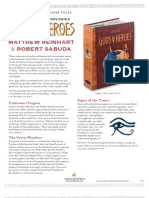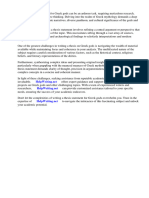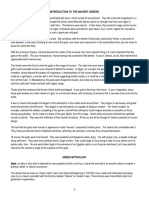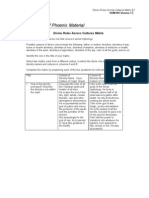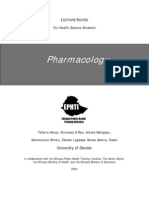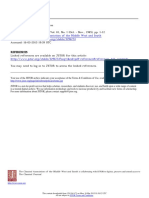0 ratings0% found this document useful (0 votes)
102 viewsUgfh1000 RJ 01 KCH
Ugfh1000 RJ 01 KCH
Uploaded by
Bryan Kan1) Ancient Greeks attributed aspects of nature like thunder and the sea to supernatural gods like Zeus and Poseidon due to their limited understanding of the natural world.
2) Over time, Greek gods took on more human characteristics as societies enriched mythology with human emotions, culture, and qualities. The gods in the Odyssey display very human traits like anger, love, and empathy.
3) Mythology was deeply ingrained in Greek culture and provided examples of ideal human virtues through gods and heroes like Odysseus. The interaction between gods and humans in myths helped ancient Greeks make sense of the world and cultivate good citizens.
Copyright:
© All Rights Reserved
Available Formats
Download as DOCX, PDF, TXT or read online from Scribd
Ugfh1000 RJ 01 KCH
Ugfh1000 RJ 01 KCH
Uploaded by
Bryan Kan0 ratings0% found this document useful (0 votes)
102 views1 page1) Ancient Greeks attributed aspects of nature like thunder and the sea to supernatural gods like Zeus and Poseidon due to their limited understanding of the natural world.
2) Over time, Greek gods took on more human characteristics as societies enriched mythology with human emotions, culture, and qualities. The gods in the Odyssey display very human traits like anger, love, and empathy.
3) Mythology was deeply ingrained in Greek culture and provided examples of ideal human virtues through gods and heroes like Odysseus. The interaction between gods and humans in myths helped ancient Greeks make sense of the world and cultivate good citizens.
Original Title
UGFH1000-RJ-01-KCH
Copyright
© © All Rights Reserved
Available Formats
DOCX, PDF, TXT or read online from Scribd
Share this document
Did you find this document useful?
Is this content inappropriate?
1) Ancient Greeks attributed aspects of nature like thunder and the sea to supernatural gods like Zeus and Poseidon due to their limited understanding of the natural world.
2) Over time, Greek gods took on more human characteristics as societies enriched mythology with human emotions, culture, and qualities. The gods in the Odyssey display very human traits like anger, love, and empathy.
3) Mythology was deeply ingrained in Greek culture and provided examples of ideal human virtues through gods and heroes like Odysseus. The interaction between gods and humans in myths helped ancient Greeks make sense of the world and cultivate good citizens.
Copyright:
© All Rights Reserved
Available Formats
Download as DOCX, PDF, TXT or read online from Scribd
Download as docx, pdf, or txt
0 ratings0% found this document useful (0 votes)
102 views1 pageUgfh1000 RJ 01 KCH
Ugfh1000 RJ 01 KCH
Uploaded by
Bryan Kan1) Ancient Greeks attributed aspects of nature like thunder and the sea to supernatural gods like Zeus and Poseidon due to their limited understanding of the natural world.
2) Over time, Greek gods took on more human characteristics as societies enriched mythology with human emotions, culture, and qualities. The gods in the Odyssey display very human traits like anger, love, and empathy.
3) Mythology was deeply ingrained in Greek culture and provided examples of ideal human virtues through gods and heroes like Odysseus. The interaction between gods and humans in myths helped ancient Greeks make sense of the world and cultivate good citizens.
Copyright:
© All Rights Reserved
Available Formats
Download as DOCX, PDF, TXT or read online from Scribd
Download as docx, pdf, or txt
You are on page 1of 1
UGFH1000-RJ-01: Odyssey by Kan Chun Him (1155076777)
Odyssey: Relationship between Ancient Greeks and Gods
On reading Odyssey, I would like to explore the relationship between Greeks and the Olympian Gods.
My thought about mythology and Greeks attitudes towards Gods will be shared using examples from Odyssey.
Greek mythology stemmed from individualized nature. With poor understanding of the hostile
environment, Greeks attributed aspects of the nature to supernatural characters. It explains why Zeus became god
of thunder while Poseidon became god of the sea. Take Poseidon as example, he is fearsome with great power
controlling storms and is unreasonable by going after Odysseus who blinded his son (Cyclopes) in self-defense. I
think it reflects Greeks deep-rooted fear toward the unpredictable sea which was their close companion for trade.
Before the emergence of philosophy or even science, failure in explaining natural phenomena induced
polytheism in many ancient civilizations. They treated the nature as omnipotent gods.
Ancient societies later enriched gods with human characters and culture. I found that the Gods are as
emotional as us. For instance, Poseidon was angry with Odysseus who harmed Cyclopes. Other Instances
include Athena getting frustrated with the selfish suitors of Penelope, or Calypso getting in love and indulged
with Odysseus, as well as other gods who felt empathetic for the suffering Odysseus endured. Hatred, anger, love
and empathy are human feelings given to gods. Meanwhile, gods were created or related to man-made elements.
Examples in Odyssey are Athena for war and Hades for death which is a special concept to human. It explains
why gods were interested in Greeks and actively involved in their lives. In my opinion, mythology was deep in
Greek culture such that gods were given feeling, human characters and realms to govern as found in Odyssey.
Human virtues are observed from gods which we can learn from. With proximity, conflicts were
common among city states. Therefore, strength and cunningness were praised and found in Athena who helped
Odysseus and his son Telemachus uprooting the greedy and arrogant suitors. Compared with the gods are the
scavengers like the suitors who refused to improve physically, mentally and morally. In between both extremes is
Odysseus who transformed himself into one with super-human strength and wisdom. He worth admiring by
being affirmative in marriage and pursue of honor as well. The gods and god-like Odysseus are role models for
people to pursue goodness. The belief of the god can also be educational and inspiring in civilizing Greeks or
even ourselves nowadays. Mythology seems to be mean to cultivate citizens.
The way ancient Greeks supplied Olympian Gods with qualities is inspiring as found in Odyssey.
Regardless of their existence, it is intriguing to witness the interaction between deities and human via Greek
Classics. It is believed that it helps explain the non-ubiquitous behavior of Gods.
Reflective Journal for UGFH 1000 instructed by Mr. R. Teng
You might also like
- Tales Odyssey DG ÆDocument18 pagesTales Odyssey DG ÆJosé Fernando100% (1)
- UGFH1000-Text 01-Odyssey PDFDocument97 pagesUGFH1000-Text 01-Odyssey PDFBryan KanNo ratings yet
- Ancient Greece, Modern PsycheDocument23 pagesAncient Greece, Modern Psycheihcamma100% (4)
- Encyclopedia Mythologica: Gods and Heroes Pop-Up Teachers' GuideDocument2 pagesEncyclopedia Mythologica: Gods and Heroes Pop-Up Teachers' GuideCandlewick PressNo ratings yet
- Thesis Statement For Greek GodsDocument4 pagesThesis Statement For Greek Godsnicholebrownbillings100% (2)
- Document 10Document1 pageDocument 10Janine AladdinNo ratings yet
- Mitologia GriegaDocument19 pagesMitologia GriegaLeobardo NavarroNo ratings yet
- Greek Ancient Mythology - A Replica of Human Life Vs The Life Refraction To The DelusionDocument5 pagesGreek Ancient Mythology - A Replica of Human Life Vs The Life Refraction To The DelusionZafira KhanNo ratings yet
- Documento Sem TítuloDocument3 pagesDocumento Sem TítuloLucas GonçalvesNo ratings yet
- Metamorphoses Tells of How This Came To Be, Through The Goddess' Triumph Over Her UncleDocument3 pagesMetamorphoses Tells of How This Came To Be, Through The Goddess' Triumph Over Her UncleKong Sun LimNo ratings yet
- The Allure of Greek MythologyDocument2 pagesThe Allure of Greek MythologysmileyNo ratings yet
- Mythology and FolkloreDocument7 pagesMythology and FolkloreTrixia MadrigalNo ratings yet
- Greek Ancient Mythology - A Replica of Human Life Vs The Life Refraction To The DelusionDocument5 pagesGreek Ancient Mythology - A Replica of Human Life Vs The Life Refraction To The Delusiontop dragonNo ratings yet
- Mythology PDFDocument6 pagesMythology PDFmonkeyluffy1059No ratings yet
- Ways of Interpreting MythDocument7 pagesWays of Interpreting Mythvisual18100% (1)
- Shilo Ghosts Demons and Gods Uncorrected ProofDocument15 pagesShilo Ghosts Demons and Gods Uncorrected ProofVanessa CianconiNo ratings yet
- Ways of Interpreting MythDocument6 pagesWays of Interpreting MythJhondriel Lim100% (1)
- Brosas - Greek Mythology AnalysisDocument5 pagesBrosas - Greek Mythology Analysisbnamme1No ratings yet
- Humaities 310 Essay 1Document7 pagesHumaities 310 Essay 1api-438538275No ratings yet
- Good Thesis On Greek MythologyDocument5 pagesGood Thesis On Greek Mythologymaritzapetersonpaterson100% (2)
- Greek Mythology: A Guide to Greek History, Gods, and MythologyFrom EverandGreek Mythology: A Guide to Greek History, Gods, and MythologyNo ratings yet
- Greek Mythology Class Notes For Mythology PacketDocument3 pagesGreek Mythology Class Notes For Mythology Packetapi-263744910No ratings yet
- Greek Mythology TattooDocument11 pagesGreek Mythology TattooNishita SainiNo ratings yet
- Atwp Synthesis EssayDocument2 pagesAtwp Synthesis Essayapi-446908060No ratings yet
- Villalba 1Document12 pagesVillalba 1Omar sarmientoNo ratings yet
- Odyssey EssayDocument3 pagesOdyssey EssayChance NewcombNo ratings yet
- Greek MythologyDocument7 pagesGreek MythologyArci AlviedoNo ratings yet
- A Brief Comparison On The Images of Gods in Chinese and Greek Mythology and The Social BackgroundDocument3 pagesA Brief Comparison On The Images of Gods in Chinese and Greek Mythology and The Social BackgroundEdvvardNo ratings yet
- 10Document2 pages10ishaNo ratings yet
- Greek Values That Have Shaped The West 2013Document19 pagesGreek Values That Have Shaped The West 2013api-294984286No ratings yet
- An Introduction To Greek MythologyDocument1 pageAn Introduction To Greek Mythologydiona macasaquitNo ratings yet
- The Complete World of Greek MythologyDocument16 pagesThe Complete World of Greek MythologyLindokuhleNo ratings yet
- WORK BY NFNDocument12 pagesWORK BY NFNGaelle MbangNo ratings yet
- A Concepts of GodDocument8 pagesA Concepts of Godkoromazain1No ratings yet
- Ethos, Mythos, LogosDocument16 pagesEthos, Mythos, LogosThomas OlshewskyNo ratings yet
- Masinadiong AssignmentNo1Document2 pagesMasinadiong AssignmentNo1Danny MasinadiongNo ratings yet
- Divine Personality and Personification: KernosDocument11 pagesDivine Personality and Personification: KernosAnant IssarNo ratings yet
- Thesis For Creation MythsDocument7 pagesThesis For Creation Mythsamberbutlervirginiabeach100% (2)
- Lecture Notes From Sept 26Document11 pagesLecture Notes From Sept 26Greg LoncaricNo ratings yet
- Greek Mythology Thesis ExamplesDocument5 pagesGreek Mythology Thesis Examplesdnrz0g8y100% (2)
- Thesis Greek MythologyDocument5 pagesThesis Greek Mythologykelleyhunterlasvegas100% (2)
- ReligionDocument2 pagesReligionRadu ValcuNo ratings yet
- Odyssey Essay - 9th GradeDocument6 pagesOdyssey Essay - 9th Gradeeagho898No ratings yet
- ZeusDocument9 pagesZeuscj8dmrnyshNo ratings yet
- The Influence of Egypt On Greek MythologyDocument2 pagesThe Influence of Egypt On Greek Mythologyatom2374No ratings yet
- Greek VS Roman GodsDocument5 pagesGreek VS Roman Godsvictoria.g.2771No ratings yet
- Mytholgical Hero and HeroineDocument3 pagesMytholgical Hero and HeroineBett WesleyNo ratings yet
- SdadasDocument4 pagesSdadasKarl SiaganNo ratings yet
- Dualities of PowerDocument2 pagesDualities of PowerjamanhussenNo ratings yet
- TheogonypaperDocument5 pagesTheogonypaperapi-242538636No ratings yet
- Wepik The Epic Tales of Gods and Heroes A Mythical Journey Through Greek Mythology 20231012014302j7Q1Document15 pagesWepik The Epic Tales of Gods and Heroes A Mythical Journey Through Greek Mythology 20231012014302j7Q1M SnehaNo ratings yet
- Thesis God GreekDocument4 pagesThesis God Greekvictoriadillardpittsburgh100% (1)
- Lectura Ancient Greek Religion - OCRDocument9 pagesLectura Ancient Greek Religion - OCRJohn Edwin López SuárezNo ratings yet
- StoryDocument6 pagesStoryPhương ThảoNo ratings yet
- Görög IstenekDocument2 pagesGörög IstenekadamNo ratings yet
- What Is Mythology? (Lecture 2 Slides)Document3 pagesWhat Is Mythology? (Lecture 2 Slides)Jeonghun LeeNo ratings yet
- Divine Roles MatrixDocument4 pagesDivine Roles Matrixtina_smigelskiNo ratings yet
- ReligionDocument5 pagesReligionHaydee Kristine A. Luzon - LabastillaNo ratings yet
- Ancient Philo CynelDocument1 pageAncient Philo CynelCynel JavierNo ratings yet
- Greek Mythology: Group MembersDocument9 pagesGreek Mythology: Group MembersAleena AhmedNo ratings yet
- Greek Mythology and Christianity Comparative AnalysisDocument2 pagesGreek Mythology and Christianity Comparative AnalysisqwshagdvndsavsbNo ratings yet
- Ugfh1000 TP KCHDocument4 pagesUgfh1000 TP KCHBryan KanNo ratings yet
- Ugfh1000 RJ 02 KCHDocument2 pagesUgfh1000 RJ 02 KCHBryan KanNo ratings yet
- Pharmacology: For Health Science StudentsDocument211 pagesPharmacology: For Health Science StudentssafibayNo ratings yet
- Eight Brief Tales of LoversDocument16 pagesEight Brief Tales of LoversXhai Dela Cruz0% (1)
- ICARUS AND DAEDELUS With Guide QuestionsDocument3 pagesICARUS AND DAEDELUS With Guide QuestionsJuicy LiciousNo ratings yet
- Alpheus and ArethusaDocument2 pagesAlpheus and Arethusaur.sunshinelee011No ratings yet
- Flower Love StoriesDocument10 pagesFlower Love Storiesmina villamorNo ratings yet
- Master of TimeDocument112 pagesMaster of TimeVincent Sampieri90% (21)
- ENglish 6 Q3 Day 1Document3 pagesENglish 6 Q3 Day 1Queens Nallic CillanNo ratings yet
- A Complete List of Greek Gods, Their Names & Their Realms of InfluenceDocument5 pagesA Complete List of Greek Gods, Their Names & Their Realms of InfluenceΜένιος ΚουστράβαςNo ratings yet
- Zeus: King of The Gods - George OConnorDocument84 pagesZeus: King of The Gods - George OConnorMelissa SteleaNo ratings yet
- Set One - Intro Chapter 1 The GodsDocument13 pagesSet One - Intro Chapter 1 The GodsLouise MarieNo ratings yet
- Hesiod's Myth of Four RacesDocument13 pagesHesiod's Myth of Four RacesEzequiel RivasNo ratings yet
- Zeus HistoireDocument3 pagesZeus Histoirejosephebi08No ratings yet
- Cyclades v5Document13 pagesCyclades v5Mr PetersonNo ratings yet
- ILIADDocument3 pagesILIADmendozakyme0No ratings yet
- The Story of IcarusDocument6 pagesThe Story of Icarusapi-435644105No ratings yet
- HomerDocument4 pagesHomermaria cacaoNo ratings yet
- GEO321 Notes 8Document4 pagesGEO321 Notes 8MarkoNo ratings yet
- Thesis Statement Greek MythDocument5 pagesThesis Statement Greek Mythleanneuhlsterlingheights100% (2)
- InglesDocument3 pagesInglesDannaNo ratings yet
- Extra Credit - Greek MythDocument8 pagesExtra Credit - Greek MythacarolynmcelroyNo ratings yet
- Iliad Odyssey PPTDocument76 pagesIliad Odyssey PPTDiem SuongNo ratings yet
- Dares-Dictys - Troia and WilusaDocument101 pagesDares-Dictys - Troia and WilusaEcaterina TaralungaNo ratings yet
- Greek Mythology: The Gods and The Golden Apple.Document6 pagesGreek Mythology: The Gods and The Golden Apple.DiegoReadsBooksNo ratings yet
- The Creation StoriesDocument3 pagesThe Creation StoriesjolaiNo ratings yet
- Charles Segal-Orpheus - The Myth of The Poet-The Johns Hopkins University Press (1989) PDFDocument125 pagesCharles Segal-Orpheus - The Myth of The Poet-The Johns Hopkins University Press (1989) PDFDana Kiosa100% (2)
- Perseus & AndromedaDocument4 pagesPerseus & AndromedaDanna Jean TambigaNo ratings yet
- English 10 - Unit TestDocument2 pagesEnglish 10 - Unit TestHope Mosquera ValdepeñasNo ratings yet
- Demonstration Lesson Plan in English 10Document4 pagesDemonstration Lesson Plan in English 10Dave FalculanNo ratings yet



